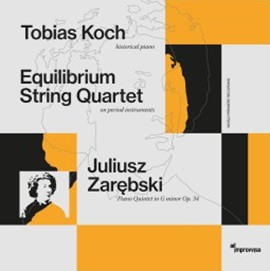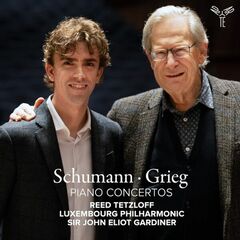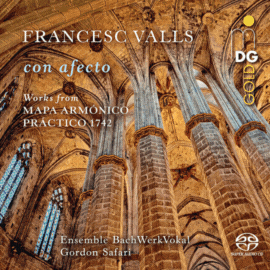Der amerikanische Pianist Reed Tetzloff und John Eliot Gardiner bringen in Schumanns Klavierkonzert ein sehr kontrastreiches Musizieren ein, wobei die lyrischen und nachdenklich-poetischen Passagen Ruhepole in einem dramatischen Ablauf sind. Derart kontrastreich aufgebaut gewinnt der erste Satz an Dramatik und an Expressivität. Der langsame Satz wird sehr lyrisch-fließend und poetisch gespielt, ohne ins Rührselige abzugleiten, während das Finale wirklich beschwingt, ja fast tänzerisch dargeboten wird.
So gelingt Tetzloff in Zusammenarbeit mit dem exzellenten, geschmeidigen und homogenen Luxembourg Philharmonic eine ansprechende, stets geschmack- und stilvolle Version.
Die Tonaufnahme ist exzellent, das Orchester klingt räumlich und präsent, das Klavier ist gut in den Orchesterklang eingebettet.
Dass es Gardiner nicht gelingen würde, die Balance zwischen Lyrismus und Virtuosität im Grieg-Konzert zu finden, war zu befürchten. So bleibt der erste Satz ein pathetisch-dramatischer Akt, der an der Musik vorbeigeht. Ach, wenn ich doch an die Nuancen denken, die Zimerman und Karajan aus diesem Satz herausgeholt haben und an jene, die mir beim Konzert mit Simon Trpceski und Christian Reif in Bukarest eine Gänsehaut bescherten…
Auch Gardiners zweiter Satz wirkt mehr gemacht als empfunden, und weil der technisch hervorragende Tetzloff im Finale deutlich die Zügel in der Hand hält, ist dieser schwungvoll und virtuos, aber immer noch recht ärmlich im Vergleich zum Klangreichtum der Karajan-Zimerman-Aufnahme.
Tetzloff hätte in diesem Werk ganz gewiss einen inspirierteren Dirigenten verdient als Gardiner.
American pianist Reed Tetzloff and John Eliot Gardiner bring a richly contrasting musicality to Schumann’s piano concerto, with the lyrical and contemplative-poetic passages providing moments of calm within a dramatic sequence. Structured in such a contrasting manner, the first movement gains in drama and expressiveness. The slow movement is played in a very lyrical, flowing, and poetic manner without slipping into sentimentality, while the finale is presented in a truly lively, almost dance-like manner.
In collaboration with the excellent, supple, and homogeneous Luxembourg Philharmonic, Tetzloff succeeds in creating an appealing, consistently tasteful, and stylish version.
The sound recording is excellent, the orchestra sounds spacious and present, and the piano is well embedded in the orchestral sound.
It was to be feared that Gardiner would not succeed in striking a balance between lyricism and virtuosity in the Grieg concerto. Thus, the first movement remains a pathetic-dramatic act that misses the point of the music. Ah, if only I think of the nuances that Zimerman and Karajan brought out in this movement, and those that gave me goose bumps at the concert with Simon Trpceski and Christian Reif in Bucharest…
Gardiner’s second movement also seems more contrived than heartfelt, and because the technically outstanding Tetzloff clearly holds the reins in the finale, it is lively and virtuosic, but still rather poor in comparison to the rich sound of the Karajan-Zimerman recording.
Tetzloff certainly deserved a more inspired conductor than Gardiner for this work.























